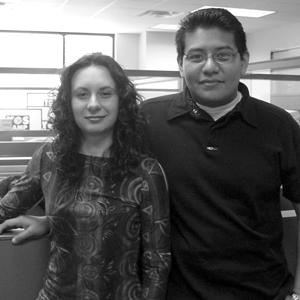TAMIU Students Get Valuable Research Experience at Texas Center

At a University, one learns theories and ideas, reads about the past and thinks about the future. But two students at Texas A&M International University are getting the opportunity to conduct hands-on research and are creating documents that can serve people now and in the future.
Both José Baez and Eleni Athanatou work for the Texas Center for Border Economics and Enterprise Development (Texas Center). Baez has completed a photographic directory of businesses along Highway 359, outside of Laredo, and is working on a second directory of businesses in Rio Bravo and El Cenizo. Athanatou has helped create the monthly publication Border Business Indicators (BBI) since May 2002. The directories and the BBI can be used to facilitate growth and economic enrichment along the border.
The directories contain a photograph, address and phone number for each of the business listed, which are sorted by category. Baez, a junior majoring in marketing at TAMIU, explained that about 75 copies have been printed for the Highway 359 directory and distributed to the Laredo Chamber of Commerce, area banks, gas stations and other places where a maximum number of people will see it. He explained that he was responsible for going into the field and speaking to the various owners about having their business included.
"The first question they asked was 'How much is this going to cost me?' and after I told them it was free, they were more open about it and more willing to give out the information. Some of them were hesitant about letting me take a picture of the business, but in the end, most of the people on Highway 359 were open to it. I guess it's kind of weird for them that someone comes to their business and tells them that they want to promote them without costing anything to them," said Baez.
Having spent many hours collecting the information, Baez feels that he has learned from his time at the Texas Center.
"It's going to help me a lot [in my career], because I'm learning how to deal with people, how to approach them, how to envision a project and go out there and do it and all the effort it takes to put it together. It's a lot of work to do," explained Baez.
Athanatou, an MBA student with a concentration in international trade, has been organizing and compiling the data for the BBI. Each month, the Texas Center publishes this short but informative publication. It lists the statistics of life along the border, including border crossings, border revenue, power connections, employment figures, airport and sea port activity. Information is collected for a variety of border towns including Brownsville, Del Rio, Eagle Pass, El Paso, Laredo, McAllen-Hidalgo and many others.
Athanatou spends her time ensuring that all the information to be included is received by the Texas Center, and that it all goes in the right place.
"I am working on a daily basis with 40 different folders. The data is local and state and there's some nationwide. For example, the airports: we have the Laredo airport, El Paso, Brownsville, McAllen. . . all of South Texas and the data comes in for in-bound and out-bound for each city and each airline. So that's very challenging," said Athanatou.
She too believes the work at the Texas Center will help her in the future and in her graduate classes at TAMIU.
"When I started working for the Texas Center, I didn't actually know, when they send you pages and pages of reports, which one to use, to be selective, to know how to analyze the numbers. It helped me on my research papers. I actually can see numbers and tell you which ones you can use and which ones you don't have to use," said Athanatou.
She is also pleased to contribute to research about the U.S.-Mexico border.
"I helped to make something and I know that these ten pages comes out and goes all over the world, it's very rewarding," she said.
The Texas Centers program, created in 1987 by the Texas Legislature, is a consortium effort between Texas A&M International University, The University of Texas Pan-American, and The University of Texas-El Paso. Its central purpose is to to provide leadership and support to Texas border communities in their economic development efforts, including activities in the areas of business development, education, health care, public administration, and the environment.
For more information about the Texas Center, please call 326.2545, visit offices in the Western Hemispheric Trade Center, room 221 or visit their website at http://texascenter.tamiu.edu/
University office hours are 8 a.m. to 5 p.m., Monday through Friday.
Journalists who need additional information or help with media requests and interviews should contact the Office of Public Affairs and Information Services at pais@tamiu.edu